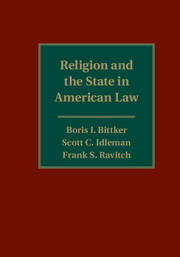Book contents
- Frontmatter
- Dedication
- Contents
- Preface
- 1 History and Introduction
- 2 Church and State in the Nineteenth Century
- 3 Religious Influences and Expressions in Law and Government
- 4 The Establishment Clause
- 5 The Free Exercise Clause
- 6 The Religious Test, Equal Protection, and Free Speech Clauses
- 7 The Definition of Religion
- 8 Church Property Disputes and Church Schisms
- 9 Contracts
- 10 Taxation
- 11 Employment
- 12 Land Use
- 13 Torts
- 14 Criminal Law and Process
- 15 Family Law
- 16 Public Education
- 17 Religious Symbolism on Government Property
- 18 Special Contexts: Prisons and the Military
- Appendix A Federal Constitutional Provisions
- Appendix B State Constitutional Provisions
- Appendix C Selected Federal Statutes 910
- Index
4 - The Establishment Clause
Published online by Cambridge University Press: 05 October 2015
- Frontmatter
- Dedication
- Contents
- Preface
- 1 History and Introduction
- 2 Church and State in the Nineteenth Century
- 3 Religious Influences and Expressions in Law and Government
- 4 The Establishment Clause
- 5 The Free Exercise Clause
- 6 The Religious Test, Equal Protection, and Free Speech Clauses
- 7 The Definition of Religion
- 8 Church Property Disputes and Church Schisms
- 9 Contracts
- 10 Taxation
- 11 Employment
- 12 Land Use
- 13 Torts
- 14 Criminal Law and Process
- 15 Family Law
- 16 Public Education
- 17 Religious Symbolism on Government Property
- 18 Special Contexts: Prisons and the Military
- Appendix A Federal Constitutional Provisions
- Appendix B State Constitutional Provisions
- Appendix C Selected Federal Statutes 910
- Index
Summary
Introduction
The Establishment Clause of the First Amendment textually provides that “Congress shall make no law respecting an establishment of religion.” In the period since its framing and ratification, now extending well over two centuries, the meaning and reach of the clause have moved beyond a strict understanding of its text. Three developments in particular warrant mention at the outset. The first is that the clause has been held to apply to all branches of government – legislative, executive, and judicial – not simply to the first of these, as the term “Congress” might suggest. The second is that by virtue of a doctrine called “Fourteenth Amendment incorporation,” the clause also has been held to apply to all levels of government – federal, state, and local – such that today it essentially applies to virtually every form of legal or governmental action. From the Congress and the president of the United States, to the agencies, universities, and court systems of the fifty states, to the school districts and police departments of every municipality, all are bound by the limits and prohibitions of the Establishment Clause. State and local governments are further constrained, moreover, by the analogous provisions of their own state constitutions. These provisions, though largely not addressed in this chapter, can differ markedly from the Establishment Clause, and several state constitutions, either by these or other provisions, specifically restrict the relationship between religion and public education or the use of public revenue for religious institutions or purposes.
The third development, which is as much cultural as legal, is that the contemporary reach and impact of the clause are also a product of developing notions of what counts as “law respecting an establishment of religion,” which itself reflects changing understandings of the American political community. Concerns that animated the clause's inclusion – ”the church exercising the coercive power of government,” “direct financial support of the church … through general tax revenue,” and “control by the state over the church” – still persist but for many may not seem like looming threats. Conversely, institutions and practices that may today immediately arouse establishment concerns – breaches in the metaphorical wall of separation between church and state – were or would have been mostly unproblematic within the world of Protestant Christianity and limited government that largely defined early America.
- Type
- Chapter
- Information
- Religion and the State in American Law , pp. 149 - 209Publisher: Cambridge University PressPrint publication year: 2015



